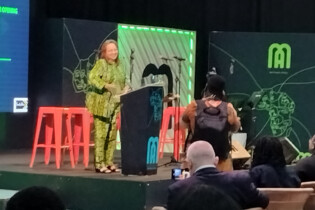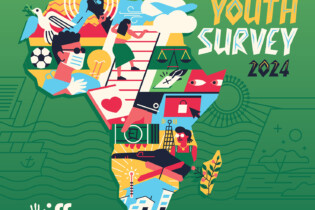The Durban ICC, the first international convention centre in South Africa, celebrates its fifteenth anniversary during August 2012. The Durban ICC has certainly developed its credentials as South Africas foremost international convention centre delivering fifteen years of world class hospitality and service to our many clients, said Durban ICCs, Chief Executive Officer, Julie-May Ellingson.
The Durban ICC story is remarkable. It is a story of foresight and vision, co-operation, endeavour, bravery, patience and above all triumph. It is a story that the eThekwini Municipality and the citizens of Durban can be justly proud of.
The formation of Operation Jumpstart, which was created to kick-start development in the city and region, brought together role players from all sectors of the community. Operation Jumpstart recognised the role that international conferences could play in stimulating the economy of the city and recommended as part of its proposals, a proposal to build an international convention centre in Durban. After many months of discussions and negotiations by the Operation Jumpstart team, the city council approved the proposal to build the centre and the first phase of the development of the Durban International Convention Centre commenced.
The then Durban City Council officially launched its international convention centre project with a media briefing held in December 1992. This was followed by a comprehensive feasibility study carried out over nine months by a core team of six consultants supported by additional specialist consultants and included in-depth research programmes and study tours to various Convention Centres in Europe. At the time the Durban ICC was one of the single largest investments made by the City of Durban and represented a statement of confidence by the city fathers and the people of Durban in the future growth and development of the city.
November 1994 saw the turning of the first sod for the construction of the Durban ICC by the then premier of KwaZulu-Natal, Dr Frank Mdlalose and the Centre was officially opened on 8 August 1997 by President Nelson Mandela.
To cater for increasing demand the Durban ICC was expanded with the opening of the ICC Arena in March 2007 transforming the centre into the largest flat floor, column free exhibitions and meetings space in Africa. Combined with the ICC Exhibition Centre, the Durban ICC can provide up to 33,000m2 of conference and exhibition space to clients. The full ICC complex was renamed the Inkosi Albert Luthuli International Convention Centre Complex in 2007 in remembrance of the former Nobel Peace Prize Laureate and former President of the African National Congress.
The Durban ICC has proved a pivotal money-spinner for the KwaZulu-Natal economy. It has generated in excess of R1-billion in income over the past fifteen years and firmly established Durban on the global conferencing map. The centre has been the trailblazer for the growth of the conferencing, meetings and exhibitions industry in South Africa with the other major cities in South Africa following Durbans example in constructing convention centres of their own, which collectively have catapulted South Africa into the 37th ranked global conferencing destination and Africas number one conference destination in terms of the ICCA 2011 rankings. The Durban ICC was originally developed as a catalyst for economic development and growth at a cost of R900-million and it has more than delivered on its return on investment for the city and province. commented Ellingson.
The Durban ICC has contributed significantly to the economy of Durban over the past fifteen years with economic impact studies indicating that the centre contributed approximately R2.7-billion to the gross domestic product of KwaZulu-Natal during the 2010/11 financial year. In the same year 3,376 people were employed directly in the province as a result of the activities of the Durban ICC with a further 4,462 employed indirectly throughout the country. In addition the Durban ICC was a net generator of R467-million in foreign exchange earnings in the same year. Measured over the past five years up until the 2011/12 financial year the Durban ICC has made a cumulative contribution to GDP of R11.4-billion.
The Durban ICC has become a world-renowned landmark in the city and has developed an enviable reputation with its ability to host the largest and most complex international conferences and meetings including events such as the XII Non-Aligned Summit in 1998, the Commonwealth heads of Government Meeting in 1999, XIII International AIDS Conference in 2000, the World Conference on Racism, Racial Discrimination, Xenophobia and related Intolerances in 2001, the 2002 African Union Summit and the COP17/CMP7 Climate Change Conference in 2011.
Reports from Durbans leading hoteliers are fulsome in their appreciation of the value that the Durban ICC contributes to the success of their own businesses. Many have indicated that their businesses would have consistently performed at lower levels without the presence of the Durban ICC attracting thousands of delegates into the city on an annual basis. Large events such as the annual Indaba Travel Trade Show and other large conferences and exhibitions consistently contribute to the bottom line of Durbans hotel, transport, restaurant and retail sectors proving the importance of the Durban ICC as a catalyst for economic growth and sustainability in Durban. For those who are still skeptical about the value of the Durban ICC another way of looking at its contribution is to imagine how things might have been if it had not been built. The foresight of those who originally conceptualised the Durban ICC as an important catalyst for economic growth and development cannot be over estimated. The fact that the Durban ICC was the trailblazer for the meetings and conventions industry in South Africa is an enormous accolade for those who pioneered its development in the city said Ellingson.
The Durban ICC will continue to act as a catalyst for the economic well being of the tourism industry in the city and region with a very important role in offsetting the seasonality that exists in the leisure tourism industry, contributing significantly towards the well-being and sustainability of the hotel, transport, restaurant and retail sectors in the city.
During the past fifteen years the Durban ICC has been the recipient of many prestigious awards but more recently the centre was again voted Africas Leading Meetings and Conference Centre by the World Travel Awards. This is the tenth time the Durban ICC has been awarded this prestigious award and has been nominated in this category again this year. The centre is rated as a 5-star venue by the Tourism Grading Council of South Africa. In addition the Centre is ISO 9001, 14001 and 22000 certified and HACCP accredited, which are internationally recognised quality standards focused on service delivery, environmental management and food safety. The Durban ICC is the only convention centre is the country to have achieved all these certifications.
The success of the past years is indicative of a team that has been totally committed to excellence and creating a sustainable convention centre. Our staff have worked tirelessly to ensure that the Durban ICC as a venue has the capacity and capability to host both small intimate events and some of the largest and most complex events in the world. said Ellingson.
The Centre has been managed by four dynamic Chief Executive Officers since its opening in 1997 including Peter Brokenshire, Alec Gilbert and Miller Matola. The current Chief Executive Officer, Julie-May Ellingson adds, the strength and stability of the Durban ICC is due to the vision and fortitude of my predecessors and is also due to the many staff members who have been with the ICC since its opening in 1997. These include John Moatshe, Hans Bregman, Mala Dorasamy, Yasmin Kolia, Mandla Cele, Helen Ve enendaal, Johannes Basi, Reginald Nyathikazi, Petros Duma, Bongi Tabete, Jabu Madikizela, Lucky Mbatha, Lucky Cele and Mbuso Shandu. Ellingson concludes we are so proud of all our long-service employees, whose dedication and commitment has enabled the ICC to retain its status as Africas Leading Convention Centre. The Board and Staff of the Durban ICC are very proud of the achievements of the Centre over the past fifteen years concludes Ellingson. The Centre has led the way in terms of the growth of the meetings, conventions and exhibitions sector in South Africa and we look forward to the next fifteen years and beyond. Our partnership with the Business Tourism industry over the past fifteen years has translated into our mutual success and the success of Durban as a major player in the global business tourism industry. We look forward to developing and strengthening our reputation as Africas destination of choice for conferences, meetings and exhibitions in the years ahead




